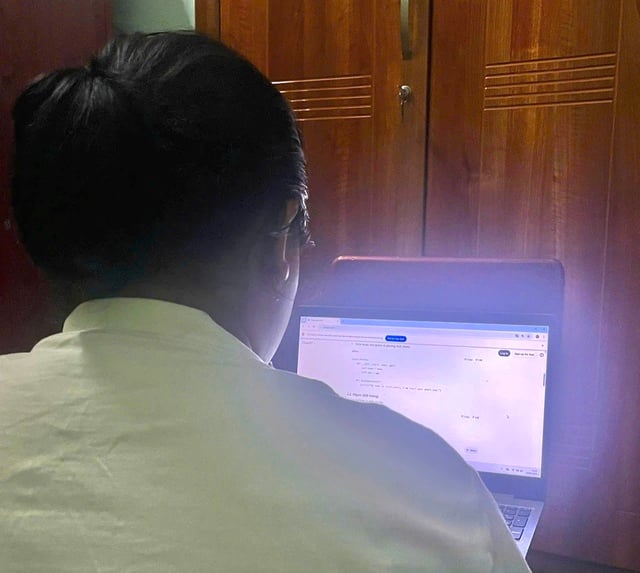
Many students have the habit of using ChatGPT to summarize lectures.
Photo: NVCC
Take photos of lectures with the thought of “reviewing later” and in reality…
The university environment, where knowledge is transmitted quickly and in large quantities in each class, requires students to be proactive in order to absorb the lesson fully and effectively. Just a little distraction during class, students can lose a lot of knowledge because they do not have time to take notes. Therefore, students think that using their phones to take pictures of lectures will be an effective solution to "record" the content.
Fearing that she would not be able to keep up with the lecture content, Nguyen Ngoc Thao Anh, a second-year student at Ho Chi Minh City Open University, chose to take photos of the lecture instead of taking notes. “In class, I often take photos of the lecture content provided by the lecturer to avoid losing the lesson and not miss important information. I often take photos with the thought 'I will review it later', but in reality, I forgot and did not review it, so I retained very little knowledge,” Thao Anh said.
Always trying to take notes of the lecturer's lecture content during class, but sometimes Phan Le Hai Yen, a second-year student at Ho Chi Minh City University of Transport, had to choose to take photos of the lecture. Because the lesson content was too long and the teaching speed was too fast, Hai Yen often took photos of the lesson content so that she could review it later. But in reality, Yen did not review the lesson as she thought.
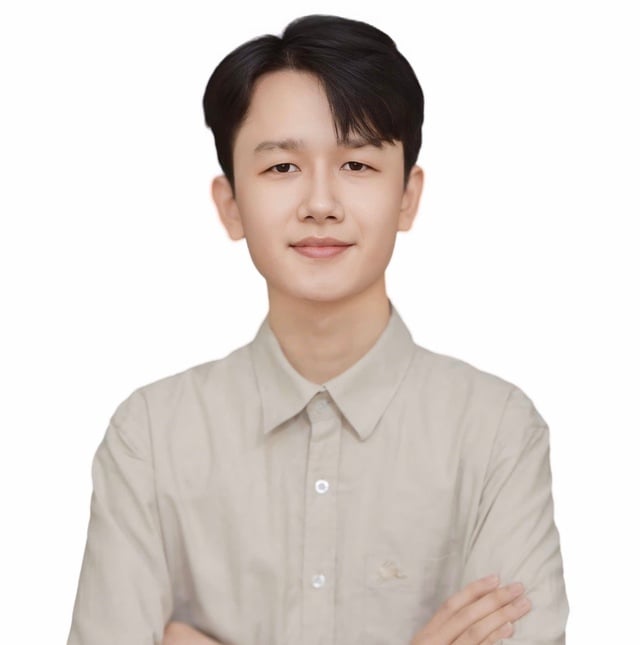
Le Van Tan, an excellent graduate of Artificial Intelligence from the University of Science (Ho Chi Minh City National University)
Photo: NVCC
Subjective because "everything is available"
In the age of technology development, modern devices have partly supported students in their studies. Students can save time by taking pictures of lectures or using AI to synthesize and summarize lecture content in just a few clicks. However, if students are subjective and rely on technology, without actively reviewing and mastering knowledge, this support will lose its meaning.
Thanks to the convenience of taking photos, along with the support of synthesizing and summarizing lectures from AI, Thao Anh gradually took fewer notes during class. With the mindset of "everything is available", the female student often did not review the lesson content immediately after class, and the photos storing the lecture content gradually fell into oblivion. "Taking few notes, combined with a subjective mentality and not reviewing knowledge from lecture photos, reduced my ability to remember during the learning process. This greatly affected my learning results and my academic performance was not as good as I expected," Thao Anh confided.
Also relying on AI support, Hai Yen shared: “Currently, my memory is not good, which has a negative impact on my learning results. I often encounter the situation of 'I know but can't remember', because I think AI can search for information so there is no need to take notes,” Hai Yen said.
How to take notes effectively
According to Master Nguyen Duc Dung, lecturer of the Faculty of Creative Communication at Nguyen Tat Thanh University in Ho Chi Minh City, students should maintain the habit of taking notes so as not to lose the initiative in memorizing. To be effective, students should take notes according to the keywords in the teacher's lecture, so that they will have enough time to take notes and still remember the lecture content.
Agreeing with this view, Le Van Tan, a student who has just graduated with honors in AI from the University of Natural Sciences (Ho Chi Minh City National University), said that he always kept the habit of taking notes during his university studies. “I always take notes in traditional notebooks because it helps me remember better. Before each class, I always take the time to research and review the documents to grasp the content in advance. When in class, I will only write down the knowledge that the teacher has explained in detail or shared in addition to the documents. This helps me to take few notes but still have time to listen to the lecture and not miss important content,” Van Tan confided.
Help first-year students increase their ability to debate and argue
Still used to passive learning and always being guided by teachers in high school, Nguyen Thanh Ngoc (student of Ho Chi Minh City Academy of Officials) was very surprised with the active learning method at university. “I was quite confused because I had to be proactive in everything at university, especially in discussions. I had difficulty due to weak argumentation skills, not daring to debate or express my own opinions when presenting or speaking. This made me feel self-conscious and often self-assessed that I was not good enough to participate in debates in class,” Thanh Ngoc confided.
In a completely new learning environment, where debates often appear in class, Huynh Le Que Chi, a first-year student at Nguyen Tat Thanh University (HCMC) was bewildered and had difficulty adapting. Chi said that when she was in high school, she mostly just listened to lectures and memorized lessons, had very few opportunities to argue or refute, and was always passive in studying. In university, Chi felt a lot of pressure when participating in debates and group work because she was afraid of conflicts when expressing her personal opinions. Being able to only absorb knowledge one way led to a decrease in learning efficiency.
According to Master Nguyen Thi Phuong Dung, lecturer of the Faculty of Creative Communication at Nguyen Tat Thanh University, students needing a solid knowledge foundation and a clear and deep understanding of the content of the debates is a factor that helps students increase their confidence when expressing their personal opinions.
To do this, according to Master Phuong Dung, students need to proactively seek knowledge from many sources, take notes to organize knowledge logically, and from there, be able to remember better. In addition, students need to practice speaking clearly and regularly participate in small discussions in class. This will help improve and gradually create a habit of critical thinking for students over time.
Source: https://thanhnien.vn/nguyen-nhan-giam-kha-nang-ghi-nho-cua-sinh-vien-thoi-ai-185250810221726604.htm


![[Photo] The 1st Congress of Phu Tho Provincial Party Committee, term 2025-2030](https://vphoto.vietnam.vn/thumb/1200x675/vietnam/resource/IMAGE/2025/9/30/1507da06216649bba8a1ce6251816820)
![[Photo] Solemn opening of the 12th Military Party Congress for the 2025-2030 term](https://vphoto.vietnam.vn/thumb/1200x675/vietnam/resource/IMAGE/2025/9/30/2cd383b3130d41a1a4b5ace0d5eb989d)

![[Photo] General Secretary To Lam, Secretary of the Central Military Commission attends the 12th Party Congress of the Army](https://vphoto.vietnam.vn/thumb/1200x675/vietnam/resource/IMAGE/2025/9/30/9b63aaa37ddb472ead84e3870a8ae825)
![[Photo] General Secretary To Lam receives US Ambassador to Vietnam Marc Knapper](https://vphoto.vietnam.vn/thumb/1200x675/vietnam/resource/IMAGE/2025/9/29/c8fd0761aa184da7814aee57d87c49b3)
















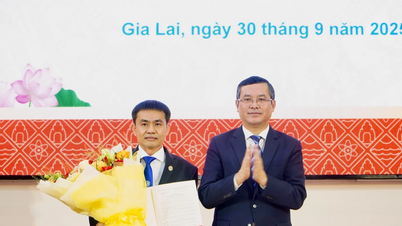







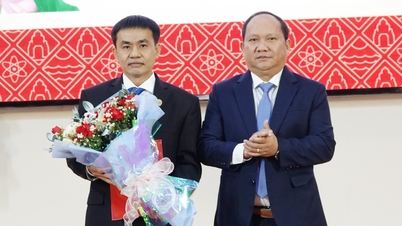

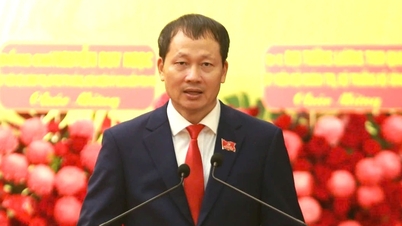



![[Photo] General Secretary To Lam attends the ceremony to celebrate the 80th anniversary of the post and telecommunications sector and the 66th anniversary of the science and technology sector.](https://vphoto.vietnam.vn/thumb/1200x675/vietnam/resource/IMAGE/2025/9/29/8e86b39b8fe44121a2b14a031f4cef46)



































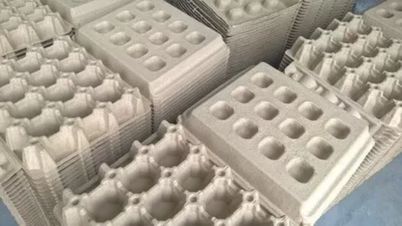





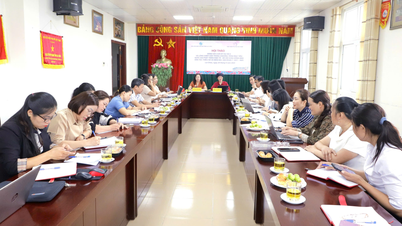


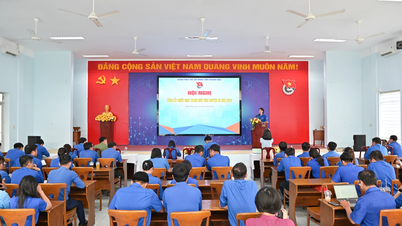
















Comment (0)